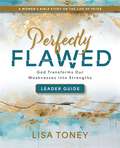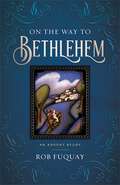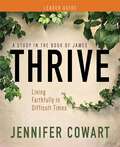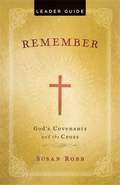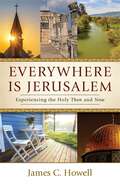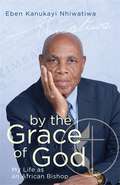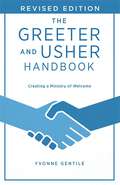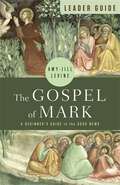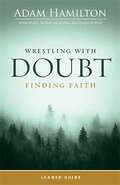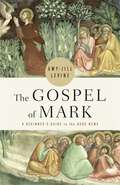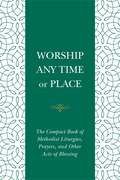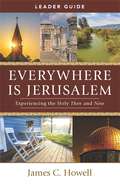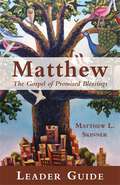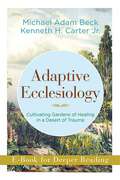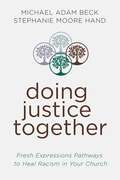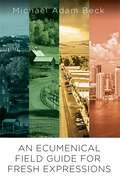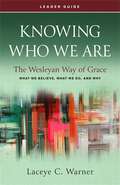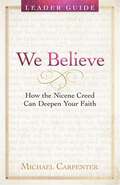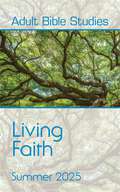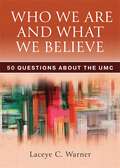- Table View
- List View
Perfectly Flawed Women's Bible Study Leader Guide: God Transforms Our Weaknesses into Strengths (A Women’s Bible Study on the Life of Peter)
by Lisa ToneyWe are all flawed, but God can turn those weaknesses into strengths.The Perfectly Flawed Leader Guide outlines six small group sessions complete with prayers, summaries, discussion questions, and video viewer guides. The leader guide will support group leaders of all experience levels in creating strong learning communities.In Perfectly Flawed, Lisa Toney shows how the apostle Peter’s passion and imperfections make him one of the Bible’s most loved and relatable people. Even when Peter gave up, gave in, and gave out, Jesus was there for him. Join Lisa as she follows Peter through his time with Jesus, from the beginning of Jesus’s ministry to the Resurrection and on through Pentecost when Peter begins to live into his call. Along the way, discover the raw honesty of a man who veered from staunch devotion to moments of doubt, mirroring our own human struggles.In the six-week Bible study Perfectly Flawed, we see that there is an unparalleled power Jesus gives that can only be found in our weakness. We discover the strength of Jesus that is available to each of us. Learn to persevere in your faith, live confidently, and boldly step into God’s purpose for you. See how Peter’s story is an invitation to embrace imperfection, find strength in the relentless grace of God, and discover how each one of us is perfectly flawed but still deeply loved by God.Other components for the Bible study include a Participant Workbook with daily readings and teaching video available on DVD.
On the Way to Bethlehem: An Advent Study
by Rob FuquayThe journey to Christmas begins in Rome.On the Way to Bethlehem follows the long journey to Christmas. The story begins in Rome with a decree issued from the seat of worldly power for a census, setting into motion events leading to the birth of the Savior of the world in a town that represents the very opposite of worldly power, Bethlehem. Author Rob Fuquay provides insight into the geographical and historical significance of Rome, Jerusalem, Nazareth, and Bethlehem, along with the important characters through whom the Christmas drama unfolds. You will be drawn into those places in a way that helps you experience the spiritual truths each location holds. The reflection we give in these places prepares the heart and soul to experience wonder, awe, mystery, and joy. Chapters include: Rome – A Place of Longing Jerusalem – A Place of Waiting Nazareth – A Place of Simplicity Bethlehem – A Place of Humility Components available to use this book in a small group study include a leader guide and video available on DVD.
Thrive Women's Bible Study Leader Guide: Living Faithfully in Difficult Times
by Jennifer CowartWalking in Faith…even when times are tough.In Thrive, author and teacher Jen Cowart helps women develop the habits and attitudes necessary to thrive, whatever their circumstances. Leading readers through the Book of James, a letter written about enduring hardships, she lifts up six characteristics of mature Christians. From endurance and humility to controlling our words, Jen helps participants find the divine and the practical in living faithfully.Jen’s teaching has inspired thousands of women across the country. Her authenticity inspires others to open their hearts and minds. One reviewer wrote, “Her ‘realness’ and her vulnerability just work together to open your heart to dig deeper and deeper.”Through this study, women will find inspiration and tools around six traits:Endurance – Embracing obstacles as a means to maturity.Wisdom – Using a heavenly perspective on earthly issues.Action – Living a life where actions match faith.Control – Taming the tongue.Humility – Developing the attitude of Christ.Prayer – Exercising the power tool of the faith.The Leader Guide contains everything needed to guide a group through the six-week study, including session plans, activities, discussion questions, and multiple format options.Additional components for this six-week Bible study, each available separately, are a Leader Guide and six video sessions, 8 to 13 minutes long (with closed captioning).
Remember Leader Guide: God's Covenants and the Cross
by Susan RobbRemember the God who remembers us.The Leader Guide contains everything needed to guide a group through the six-week study, including session plans, activities, discussion questions, and multiple format options.God’s covenants throughout the Old Testament show the character of God’s promises to the people of Israel. In this book, Susan Robb leads readers through the covenants with Noah, Abraham, Moses, and David, followed by the new covenant established on Maundy Thursday. The Lenten story culminates with an examination of the cross as another example of God’s promise for a new world.Susan Robb teaches readers the basic lessons of the covenants through a mixture of biblical history and personal stories. Her pastoral character and warm tone provide a basis for understanding God’s promises through history and the role of Jesus’s passion and crucifixion in the history of the covenants.Remember can be read alone or used for a six-week group study and church wide Lenten program. Components include a comprehensive Leader Guide and video teaching sessions featuring Susan (with closed captioning).
The Fullest Possible Love: Living in Harmony with God and Neighbor
by Paul W. ChilcoteA new and age-old way of practicing the Christian faith.What does Wesleyan theology and the Methodist way of life have to do with Benedictine ideas and practices? Renowned teacher Paul W. Chilcote reveals surprising and profound similarities and overlaps in the practices and theological convictions of these two Christian streams. Chilcote is a United Methodist scholar, elder, and serves as a Benedictine oblate. He writes from his own spiritual life, offering a gift to readers who are interested in Methodism and mysticism. Chilcote teaches a remarkable approach to spiritual practice; it is a new and age-old way of practicing our faith.
Everywhere Is Jerusalem: Experiencing the Holy Then and Now
by James C. HowellLocation matters.Christianity isn’t a batch of spiritual thoughts or metaphysical truths. It’s a journey of real people with their feet on the ground in real places. In Everywhere Is Jerusalem, James Howell takes you on a spiritual pilgrimage to significant places in the ongoing story of the Christian faith. You’ll go from Bethlehem to Jerusalem, from the Jordan River to Assisi, and from the Sea of Galilee to Montgomery, Alabama. Along the way, you’ll discover the profound connections between biblical stories and the places they happened. You’ll see how Christians throughout history have brought their faith to life worldwide, in their own cities and communities. And you’ll find God calling you to bring your own faith to life right where you are, right now. Part travelogue, part Bible study, this book will take you on a spiritual journey to the places that are most important in our faith, and you’ll discover that the most important place of all is the place where you are, right now. Other study components include a Leader Guide and video available on DVD.
By the Grace of God: My Life as an African Bishop
by EBEN KANUKAYI NHIWATIWAAn African bishop shares his story and ministry.Born in the small Zimbabwean village of Gandanzara, Bishop Eben Kanukayi Nhiwatiwa became an inspired and accomplished leader in the church and larger society. Elected as a bishop in The United Methodist Church in 2004, he has guided ministries in Zimbabwe and across Africa and beyond through periods of immense and rapid change. In his book By the Grace of God, the bishop takes the reader through his educational odyssey, winding through Zimbabwe and the United States. He narrates with humor his introduction to the US and its unfamiliar customs. He inspires readers with the story of the remarkable series of events that shaped him as a Christian and bishop.The book provides a succinct master class on the art and science of leadership. Drawing inspiration and insights from an array of literature and astute observation, Nhiwatiwa synthesizes what have been his most important gleanings about factors that contribute to visionary and effective leadership.Nhiwatiwa became known as the “Chabadza Bishop,” advocating for vibrant mutual partnerships with churches and annual conferences in other parts of the world. Chabadza is a Shona word meaning “to give a helping hand to someone who is already working.” He urges people asking for help to be active workers in the project themselves. He has diligently advanced ideas for collaboration that eliminate approaches rooted in maintaining dependency.Nhiwatiwa writes, “Life-changing events in my life took place, not because of my sustained goal to pursue a certain objective, but that by the grace of God.” His witness and leadership have helped transform The United Methodist Church for ministry in the twenty-first century.
The Greeter and Usher Handbook - Revised Edition: Creating a Ministry of Welcome
by Yvonne GentileEquip your greeters and ushers for radical hospitality. The Greeter and Usher Handbook provides a guide to the responsibilities of those who are generally the first faces visitors encounter in church: the usher and the greeter. Intended for training use by church staff or volunteers, the text covers responsibilities related to all aspects of creating a welcoming atmosphere for visitors and new members.This Revised Edition includes updated position descriptions and best practices reflecting a greater use of online resources and an emphasis on the greeter’s and usher’s role in safety and security.
Matthew: The Gospel of Promised Blessings
by Matthew L. SkinnerExplore the tenderness and the tensions in the teachings of Jesus. The Gospel of Matthew portrays Jesus and his message as full of tender compassion and urgent warning. This six-part exploration of an enigmatic Gospel takes readers into the themes, topics, and tensions at the heart of Matthew's story about the life and work of Jesus. Chapters focus on blessing and comfort, judgment and retribution, the meaning of discipleship, Jesus’ vision for the Church and world, conflicts and complaints, and how the Gospel of Matthew speaks to believers today. The book can be read alone or used by small groups anytime throughout the year. Components include video teaching sessions featuring Matthew Skinner and a comprehensive Leader Guide.
The Gospel of Mark Leader Guide: A Beginner's Guide to the Good News
by Amy-Jill LevineDiscover the Good News in the Bible’s earliest GospelWalk through the Bible’s earliest source for the life of Jesus with scholar Amy-Jill Levine as she examines John the Baptizer, the Little Apocalypse, the Transfiguration, and several of Jesus's most notable stories and parables. The Good News of the gospel message comes alive in this book as readers see Jesus as divine and human, powerful and weak, approachable yet mysterious. The book features an in-depth study of select passages and illuminates the Gospel in its historical context and as a source for the other gospels.This comprehensive Leader Guide contains everything needed to guide a group through the study.Additional components for this 6-week study include the book, The Gospel of Mark: A Beginner’s Guide to the Good News, and DVD/Video sessions featuring Amy-Jill Levine (with closed captioning).
Questions Jesus Asked: A Six-Week Study in the Gospels
by Magrey deVegaWhat does Jesus want to know about us?Jesus was fond of asking questions, many of which cut right to the heart of what it means to be human. Why are you terrified? What do you live for? Who do you say that I am? In Questions Jesus Asked, author Magrey deVega explores six of the most provocative questions Jesus posed to others and guides us in answering them for ourselves.Asking these questions takes courage. Not only do they reveal what Jesus really cares about, they open a window into our hearts. We all have questions for God, but growth happens when we turn things around and ask what Jesus wants to know about us. When we dare to raise them, these questions bring us a fuller appreciation for the wisdom, power, and presence of God in our lives. Are you willing to step out in faith? Are you ready to answer the questions Jesus asked?The book can be read alone or used by small groups, and can be used anytime throughout the year. Additional components include video teaching sessions featuring Magrey deVega, and a comprehensive leader guide, making this perfect as a six-week group study done throughout the year.
Final Words From the Cross Leader's Guide
by Adam HamiltonIn 24 Hours That Changed the World, Adam Hamilton took us on a Lenten journey through the last day of Jesus' life. Now, in his inspiring follow-up book, Hamilton examines Christ’s dying hours and his final words as seen and heard through the eyes and ears of those who stood near the cross.Moving through each chapter you will begin to understand and respond to Jesus’ final words at the cross while learning about those who were eye witnesses to the crucifixion. In the final chapter, Hamilton moves beyond the cross to Jesus' words to the disciples on the road to Emmaus and to those who were witnesses to the Resurrection.This small-group Leader Guide is a companion piece to the Final Words DVD and contains seven teaching sessions with topics that include:Father Forgive ThemBehold Your SonMy God, Why Have You Forsaken Me?Today You Will Be with Me in ParadiseI ThirstInto Your Hands I Commit My SpiritOn the Road to EmmausLent, Lenten, Lenten Resource, Lenten Resources, Lent Study, Lent Studies, Easter, Easter Study, Easter Studies
Wrestling with Doubt, Finding Faith Leader Guide
by Adam HamiltonDoes your faith make room for questions?The Leader Guide contains everything needed to guide a group through the six-week study, including session plans, activities, discussion questions, and multiple format options. Everyone has doubts. Where is God when bad things happen? Does God hear our prayers? Is there a heaven? How can we know? Often, we treat such questions as the enemy of faith. But uncertainty doesn’t mean our belief is lacking. Doubt can be a path to a deeper, richer encounter with God.In Wrestling with Doubt, Finding Faith, join best-selling author and pastor Adam Hamilton as he discusses some of our most significant sources of doubt and shows how a steady trust in God can emerge from them. You will delve into questions like:“Does God exist? How can I know?”“Is the Bible true?”“Why do prayers go unanswered?”Hamilton approaches these sources of doubt with honesty and insight, drawing on the rich wisdom of the Bible, Christian tradition, and his experience walking with thousands of people on their spiritual journeys. Whether you’re a longtime Christian or someone brand new to faith, this book will lead you to a trust in God that gives you the courage to ask tough questions. Though you may wrestle with doubt, you’ll discover a faith that—rather than providing simple answers—includes belief and trust as well as uncertainty and mystery.Additional components include the book, Wrestling with Doubt, Finding Faith, video teaching sessions featuring Adam Hamilton (with closed captioning), and a digital worship and sermon series that make this perfect as a group study and church-wide program done throughout the year.
The Gospel of Mark: A Beginner's Guide to the Good News
by Amy-Jill LevineDiscover the Good News in the Bible’s earliest GospelWalk through the Bible’s earliest source for the life of Jesus with scholar Amy-Jill Levine as she examines John the Baptizer, the Little Apocalypse, the Transfiguration, and several of Jesus's most notable stories and parables. The Good News of the gospel message comes alive in this book as readers see Jesus as divine and human, powerful and weak, approachable yet mysterious. The book features an in-depth study of select passages and illuminates the Gospel in its historical context and as a source for the other gospels.Additional components for this 6-week study include a comprehensive Leader Guide and DVD/Video sessions featuring Amy-Jill Levine (with closed captioning).
Worship Any Time or Place: The Compact Book of Methodist Liturgies, Prayers, and Other Acts of Blessing
by Nelson CowanBe prepared at a moment’s noticeThis book equips the Methodist pastor, worship leader, or layperson to create meaningful worship moments for any group of people, any time, any place. It includes liturgies and prayers suitable for traditional settings such as worship services, funeral services, and administration of the sacraments. It includes words to use during hospital visits, retreats, church meetings, and other conventional settings. It provides words of blessing for departing members. It also provides language for other spaces and places, like home blessings, blessings for foster care families, words for times of transition, liturgies for fresh expressions of the church, prayers before the beginning of work, language for protests and vigils, ritual moments for difficult conversations, and prayers for interreligious and ecumenical events. It offers words of lament to use after violent events and natural disasters. From pulpits to pews, from altar tables to dinner tables, from sanctuaries to streets, the Compact Guide can be used by all ministers—clergy and laity—to employ worshipful words as the Spirit leads.
Everywhere Is Jerusalem Leader Guide: Experiencing the Holy Then and Now
by James C. HowellLocation matters.The Leader Guide contains discussion questions and session plans for a six-week study of Everywhere Is Jerusalem, by James C. Howell. It includes opening and closing prayers, optional activities, and session goals for each week and is designed to be used with the book and DVD.Christianity isn’t a batch of spiritual thoughts or metaphysical truths. It’s a journey of real people with their feet on the ground in real places. In Everywhere Is Jerusalem, James Howell takes you on a spiritual pilgrimage to significant places in the ongoing story of the Christian faith. You’ll go from Bethlehem to Jerusalem, from the Jordan River to Assisi, and from the Sea of Galilee to Montgomery, Alabama. Along the way, you’ll discover the profound connections between biblical stories and the places they happened. You’ll see how Christians throughout history have brought their faith to life worldwide, in their own cities and communities. And you’ll find God calling you to bring your own faith to life right where you are, right now.Part travelogue, part Bible study, this book will take you on a spiritual journey to the places that are most important in our faith, and you’ll discover that the most important place of all is the place where you are, right now.
Matthew Leader Guide: The Gospel of Promised Blessings
by Matthew L. SkinnerExplore the tenderness and the tensions in the teachings of Jesus. The Leader Guide contains everything needed to guide a group through the six-week study, including session plans, activities, discussion questions, and multiple format options. Components include the book, Matthew: The Gospel of Promised Blessings, and video teaching sessions featuring Matthew Skinner. The Gospel of Matthew portrays Jesus and his message as full of tender compassion and urgent warning. This six-part exploration of an enigmatic Gospel takes readers into the themes, topics, and tensions at the heart of Matthew's story about the life and work of Jesus. Chapters focus on blessing and comfort, judgment and retribution, the meaning of discipleship, Jesus’ vision for the Church and world, conflicts and complaints, and how the Gospel of Matthew speaks to believers today.
Adaptive Ecclesiology: Cultivating Gardens of Healing in a Desert of Trauma
by Kenneth H. Carter Jr. Michael Adam BeckThis digital-only e-book provides foundational material on adaptive leadership for the church. It is for seminary students, people training for ministry in other settings, and local church leaders who are striving to understand the biblical and theological underpinnings of adaptive ecclesiology. These readers will also gain knowledge about how this approach has worked historically, and how it is used inside and outside the Church today. The authors’ main book on the topic, Gardens in the Desert: How the Adaptive Church Can Lead a Whole New Life, is more practical in its focus, helping pastors and other leaders know how to begin shifting toward adaptive ecclesiology in their own local churches. The Adaptive Ecclesiology digital-only e-book is a deeper look at the foundations of the topic.
Doing Justice Together: Fresh Expressions Pathways for Healing in Your Church
by Michael Adam Beck Stephanie Moore HandTransform your church with grace.Doing Justice Together introduces a process using Scripture as a souce of inspiration and instruction for pastors and church people to move through together, to re-envision and reorient themselves away from old, harmful habits. Beck and Hand show pastors how they can, over time, lead the congregation to become a place where racial harmony, justice, and liberation are intrinsic to the structure and life of the church. The authors lay out four pathways for discerning and correcting the unjust patterns that often sneak into church life unnoticed. They also share other leaders’ stories from a variety of settings where this process has led to healing, revival, and hope.Following the pathways, pastors and congregants will be equipped to thoughtfully transform their church. They’ll make changes with grace and care, honoring and including longtime members. And they’ll begin new ministries—perhaps reaching people they could never have imagined reaching before--becoming a fresh expression of church in their community.
The Quiet House: Reflections on the Loss of a Spouse
by Ronald J. GreerFind comfort in a message of hope and healing.The loss of a spouse is a devastating experience, but pastoral counselor Ron Greer invites readers into his own grief journey with messages of hope and healing. The Quiet House calls on the image of a home silenced by absence but also speaks about the possibility of moving forward together through the heartache of loss toward hope. Through an elegant series of personal reflections, Greer, a pastoral counselor, offers steps and reflections of healing while tending to marriage memories. Pastors may find this book a profound help and comfort for grieving members.
An Ecumenical Field Guide For Fresh Expressions
by Michael Adam BeckLearn the essentials of fresh expressions for your church.An Ecumenical Field Guide for Fresh Expressions is a practical manual for understanding and implementing Fresh Expressions for a church in any denominational setting.The Fresh Expressions movement is a new way of thinking about the local church and a new way of doing church as a congregation. It refers to new (fresh) iterations or types (expressions) of ministry, usually outside the confines of the church building. These iterations or types of ministries are formed intentionally but organically out in the community, where people are. They are based on shared activities or interests, where people are gathering already, and where the people are open to or interested in learning about Jesus. Christian people share their own stories of how Jesus is part of their lives. Often, these gatherings become regular and increasingly begin to adopt the practices of a church community, like worship, service, study, and giving. Thus, they become fresh expressions of the church from which they sprang.
Knowing Who We Are Leader Guide: The Wesleyan Way of Grace
by Laceye C. WarnerDiscover what sets United Methodism apart. The Leader Guide contains everything needed to guide a group through the six-week study, including session plans, activities, discussion questions, and multiple format options. Components include a book, Knowing Who We Are, and video teaching sessions featuring Laceye Warner, making this perfect as a group study throughout the year. A companion book, Who We Are and What We Believe: 50 Questions about The UMC, is also available.In this book, Laceye C. Warner invites you to a richer understanding of Wesleyan Christianity so you can have a clear sense of identity, better express your own beliefs, and deepen your connection with The United Methodist Church. She introduces you to important values and characteristics that make the Wesleyan way distinctive, including emphasizing God’s grace for all and sanctification as tangible transformation in your life, your community, and all creation. You’ll see how The United Methodist Church today is deeply rooted in the Christian tradition and a legacy of care, compassion, and active response to injustice in the world. And you’ll find that Christian faith in the Wesleyan tradition holds together personal faith and community life, along with a commitment to justice through ministry and service. Pick up this book and study it with your small group and discover a way of being Christian that fills you with joy, moves you to follow Jesus wholeheartedly, and spurs you to live with compassion and grace.
We Believe Leader Guide: How the Nicene Creed Can Deepen Your Faith
by Michael CarpenterWe believe in one God.The Leader Guide contains discussion questions and session plans for a six-week study of We Believe: How the Nicene Creed Can Deepen Your Faith by Michael Carpenter. It includes opening and closing prayers, optional activities, and weekly session goals. It is designed to be used with the book and DVD.Discover how the ancient Nicene Creed can transform your spiritual journey in Michael Carpenter's empowering book, We Believe: How the Nicene Creed Can Deepen Your Faith. Personal anecdotes and practical insights guide you to a profound connection with God. Dive into six chapters, covering the Nicene Creed sequentially, that unpack the essence of it, enriching reader's faith and deepening their understanding of Christian beliefs.
Adult Bible Studies Summer 2025 Student
by Nathan WittmanGrow your faith. Transform your life.Cultivate a deeper relationship with God through Adult Bible Studies. Each weekly lesson offers background and focal Scriptures, key verses, and doctrinally sound and relevant biblical interpretation and application in a readable font size. Annual plans provide comprehensive coverage of the Bible, special lessons during the church seasons of Advent/Christmas and Lent/Easter, and suggestions for developing spiritual practices such as prayer, worship, community, and service, among many others. Adult Bible Studies is a reliable companion and guide for learning and growing in the Christian faith.Summer 2025 Theme: Living FaithThis summer, our Bible lessons follow the theme “Living Faith.” Except for one lesson from the book of Acts that provides background information about Paul’s arrival in Corinth and his ministry there, the Focal Passages for this quarter’s lessons come from 1 Corinthians. With the help of the Adult Bibles Studies Teacher/Commentary Kit, and DVD, your group will embrace the fact that it’s not just about learning - it’s about living out biblical teachings.Visit AdultBibleStudies.com and sign up for the weekly newsletter to automatically receive the FREE Current Events Supplement and other information about these resources and more!This resource, endorsed by the Curriculum Resources Committee of The United Methodist Church, offers a year-round, weekly Bible study plan for Sunday school classes and other small groups.
Who We Are and What We Believe: 50 Questions about the UMC
by Laceye C. WarnerClear answers to common questions.This small, simple, and shareable book about The United Methodist Church is a helpful reference guide to everything that makes The UMC distinctive. Written in a clear, accessible style by Laceye Warner, Who We Are and What We Believe: 50 Questions about the UMC contains answers to fifty common questions about who United Methodists are, what we believe and practice, and what sets us apart. Use it alone or as a companion to Knowing Who We Are: The Wesleyan Way of Grace.
